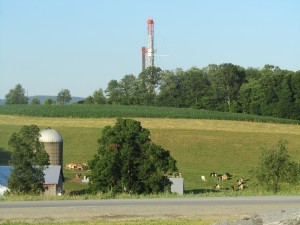Burning Questions: Quarantined Cows Give Birth to Dead Calves
-
Susan Phillips
This is part of an ongoing StateImpact series answering reader-submitted burning questions about natural gas drilling. Last week, we tackled water testing, whether or not fracking can lead to earthquakes, the status of the state’s deep injection wells, and all things water. Today we’re following up to a story covered heavily by the press more than a year ago.
In late April 2010, drilling waste water from a large storage pond leaked through its plastic liner and flowed onto a cow pasture in Shippen Township, Tioga County. Farmers Don and Carol Johnson found the leak, along with the hoof prints of 28 beef cattle who had wandered through and possibly drank the contaminated water. The waste water came from a well that had been fracked on their property by East Resources.
When tested, the water contained chloride, iron, sulfate, barium, magnesium, manganese, potassium, sodium, strontium and calcium. The spill killed all vegetation in an area 30 feet by 40 feet. In early May, Pennsylvania’s Department of Agriculture quarantined the cows, worried that the resulting beef could be tainted and make people sick. East Resources objected to the quarantine, saying it was an unnecessary step to take. It was Pennsylvania’s first quarantine resulting from gas drilling.
In this most recent “burning question” we’re looking at what happened to those cows. The question comes from Andy Leahy, and it’s a good one. Leahy is a blogger with NY Shale Gas Now. He asked the question because he says reporters will often seize on a potentially catastrophic headline, but fail to follow-up and report the real impact.
“Well, you don’t put hoof marks in that water, that deep, without somebody drinking something,” says Johnson.
The water had a high salt content, and Johnson says animals, including cows, like to lick up salt.
Of the original cows, only ten yearlings are still quarantined. But Johnson says of the eleven calves born this spring, only 3 have survived.
“It’s abominable,” says Johnson, who along with her husband Don, has been raising cows on that land for 53 years, after taking over the farm from Don Johnson’s grandfather. “They were born dead or extremely weak. It’s highly unusual,” she said. “I might lose one or two calves a year, but I don’t lose eight out of eleven.”
Johnson says necropsies of two calves have been performed and it lists E. coli bacteria as the cause of death. She says a veterinarian she consulted said if the cows did consume the frack water, that could have compromised their immune system. But the necropsies themselves are inconclusive when it comes to a direct link between the contamination and the weak and stillborn calves.
The cows themselves appear healthy. It’s unclear what the cows ingested or how it impacted them because to test for toxins, they would have to be killed.
The Department of Agriculture confirmed the status of the quarantine. But we have yet to hear back from them on what type of follow-up occurred, and what their own veterinarians concluded about the stillborn calves.
We also contacted the state Department of Environmental Protection, which conducted the initial investigations of the spill. DEP says they have concluded their investigation and fined East Resources more than $36,000. Although we contacted the inspector working for the oil and gas division, we heard back from a press person. The press office told us to contact the Department of Agriculture, and we were also instructed not to contact employees for the oil and gas division because they are too busy to speak to reporters.
Shell Oil and Gas has since taken over East Resources, and now controls the lease. Johnson says she wants Shell to buy her entire herd of cattle and start fresh. And she warns hunters she sees near her property not to eat any of the game they catch. “Deer, grouse, rabbits, they’re up on that [well] pad licking,” she says. “They don’t know what’s in the water….The whole thing has become one big mess.”
We asked Shell if they would be willing to buy the Johnson cows but haven’t yet heard back from them. We’ll let you know when we do. Carol Johnson says she regularly tests her water for contaminants and so far, it’s come up clean.

















